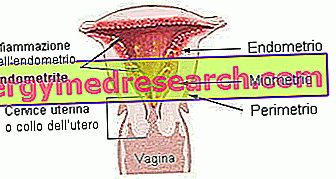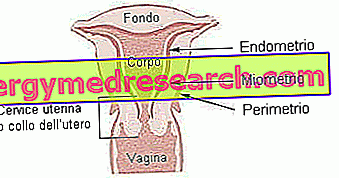Vaginal dryness is a fairly common problem, especially in certain periods of life. Typical of climacteric and of the years following menopause, the dryness of the vagina is very often a brake on one's sexual serenity, an obstacle - fortunately - anything but insurmountable. The problem of vaginal dryness can in fact be solved not only by applying the appropriate lubricating gels available in the pharmacy, but also by resorting to more "innovative" and equally safe solutions
Category woman's health
Definition Metrorrhagia is a loss of uterine blood that is outside normal blood loss related to the menstrual cycle; in fact, in fact, it occurs in the intermenstrual period. When metrorrhagia appears during menstruation, it is called menorrhagia (the result is abundant blood loss); if instead the flow, besides being abundant, continues even in the intermenstrual phase we speak more correctly about menometrorrhagia
Definition Metritis is a general inflammation of the uterus that normally occurs within the first 7-14 days after delivery. The term "metritis" is now obsolete, as it is too general and approximate. To date, to indicate an infectious-inflammatory process of the uterus in women, we prefer to speak of "pelvic inflammatory disease", while "metritis" is more commonly used in the veterinary field
Introduction The diagnostic picture of uterine myomas - or uterine fibroids - could, in some cases, be problematic, not only for the effects that are found at the level of the organism, but also for the detection of symptoms. In most cases, the uterine myomas are in fact asymptomatic, so the woman does not notice the presence of these benign neoplases: the statistics show that 50% of uterine myomas do not involve symptoms, so the detection of the tumor is a consequence of a fortuitous event
Menstrual delay Among the various disorders related to menstruation, oligomenorrhea indicates an alteration in the duration of the ovarian cycle, which manifests itself with a delay of more than four days: in other words, we speak of oligomenorrhea when the interval between a menstruation and the another exceeds 32-35 days
What are The eggs for candida are particular medicinal products, formulated with active ingredients useful to counteract the vaginal fungal infection sustained by yeasts of the genus Candida . Although the species belonging to this genus are different, the one most commonly implicated in vaginal infections is undoubtedly Candida albicans
What is the morning-after pill? The morning-after pill is a progestin-based pharmaceutical preparation useful in emergency contraception: this can be taken following a sexual relationship potentially at risk of pregnancy. The woman, after a non-repeatable medical prescription, can take the morning-after pill no later than 72 hours immediately following unprotected sexual intercourse
Reflections If on the one hand the average age of the first sexual intercourse has greatly decreased in the last decade, on the other hand the sale of the morning-after pill has undergone an impressive peak upwards. The statistics speak for themselves: over 350, 000 blisters containing the morning-after pill were sold, a clear indication of lightness in dealing with sexual experiences, as well as ignorance about sex education among young people and, in particular, among the very young
Important introduction It would be wrong, senseless and unreasonable to consider the morning-after pill as a habitual contraceptive model to remedy potential risk situations or continuous and repeated "accidents". Although the morning-after pill does not present particular contraindications of use, nor numerous side effects, it certainly does not mean that it can be used normally and lightly, nor even consider it a method of contraception of excellence (as, unfortunately, happens for many young women girls)
Menses in advance Among the disorders related to menstruation, stands the polymenorrhea, a frequent condition that denotes the shortening of the intermenstrual period: it means that menstruation occurs prematurely, before passing the canons 24 days after their end. In other words, we talk about polymenorrhea in cases where menstruation occurs in advance
See also: endometrial polyps Key points Uterine polyps are soft growths, pedunculated or sessile and generally benign, growing along the endometrial or cervical tract of the uterus. Causes The precise cause responsible for the uterine polyposis is not known. It is hypothesized that the development of polyps in the uterus depends on the excessive growth of endometrial cells, linked to estrogenic alterations










